新人教版八年级英语下册教案2014
- 格式:doc
- 大小:658.00 KB
- 文档页数:58
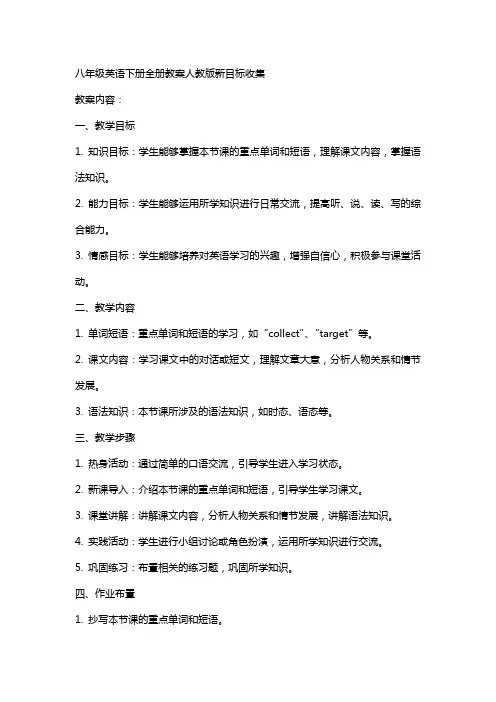
八年级英语下册全册教案人教版新目标收集教案内容:一、教学目标1. 知识目标:学生能够掌握本节课的重点单词和短语,理解课文内容,掌握语法知识。
2. 能力目标:学生能够运用所学知识进行日常交流,提高听、说、读、写的综合能力。
3. 情感目标:学生能够培养对英语学习的兴趣,增强自信心,积极参与课堂活动。
二、教学内容1. 单词短语:重点单词和短语的学习,如“collect”、“target”等。
2. 课文内容:学习课文中的对话或短文,理解文章大意,分析人物关系和情节发展。
3. 语法知识:本节课所涉及的语法知识,如时态、语态等。
三、教学步骤1. 热身活动:通过简单的口语交流,引导学生进入学习状态。
2. 新课导入:介绍本节课的重点单词和短语,引导学生学习课文。
3. 课堂讲解:讲解课文内容,分析人物关系和情节发展,讲解语法知识。
4. 实践活动:学生进行小组讨论或角色扮演,运用所学知识进行交流。
5. 巩固练习:布置相关的练习题,巩固所学知识。
四、作业布置1. 抄写本节课的重点单词和短语。
2. 完成课后练习题。
3. 预习下一节课的内容。
五、教学评价1. 课堂表现:观察学生在课堂上的参与程度、发言情况等。
2. 作业完成情况:检查学生作业的完成质量和对知识点的掌握程度。
3. 课后反馈:与学生家长沟通,了解学生的学习情况,及时调整教学方法。
六、教学策略1. 任务型教学法:通过设定具体的任务,让学生在完成任务的过程中运用所学知识,提高学生的实际应用能力。
2. 情境教学法:创造真实的语言环境,让学生在特定的情境中学习英语,提高学生的交际能力。
3. 合作学习法:鼓励学生进行小组合作,培养学生的团队协作能力和沟通能力。
七、教学资源1. 教材:使用人教版八年级英语下册教材,作为主要教学资源。
2. 多媒体课件:制作多媒体课件,辅助教学,增加课堂的趣味性。
3. 网络资源:利用网络资源,相关的教学素材,丰富教学内容。
八、教学进度安排1. 第1周:学习第1单元,掌握重点单词和短语,理解课文内容。
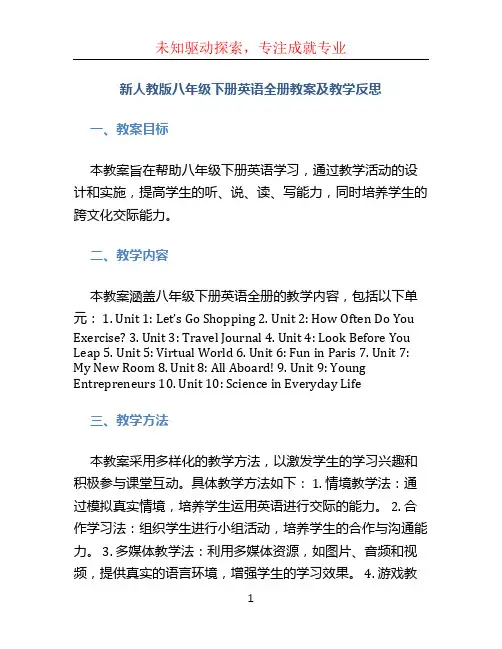
新人教版八年级下册英语全册教案及教学反思一、教案目标本教案旨在帮助八年级下册英语学习,通过教学活动的设计和实施,提高学生的听、说、读、写能力,同时培养学生的跨文化交际能力。
二、教学内容本教案涵盖八年级下册英语全册的教学内容,包括以下单元:1. Unit 1: Let’s Go Shopping 2. Unit 2: How Often Do You Exercise? 3. Unit 3: Travel Journal 4. Unit 4: Look Before You Leap 5. Unit 5: Virtual World 6. Unit 6: Fun in Paris 7. Unit 7: My New Room 8. Unit 8: All Aboard! 9. Unit 9: Young Entrepreneurs 10. Unit 10: Science in Everyday Life三、教学方法本教案采用多样化的教学方法,以激发学生的学习兴趣和积极参与课堂互动。
具体教学方法如下: 1. 情境教学法:通过模拟真实情境,培养学生运用英语进行交际的能力。
2. 合作学习法:组织学生进行小组活动,培养学生的合作与沟通能力。
3. 多媒体教学法:利用多媒体资源,如图片、音频和视频,提供真实的语言环境,增强学生的学习效果。
4. 游戏教学法:设计各种语言游戏,使学生在愉快的氛围中学习和巩固英语知识。
四、教学步骤1. Unit 1: Let’s Go Shopping•阅读教材课文,学习并掌握新单词和短语。
•完成课后练习,加强对词汇和语法的理解。
•制作购物清单,进行角色扮演,练习购物对话。
2. Unit 2: How Often Do You Exercise?•听取学生的运动习惯,并进行统计分析。
•学习频率副词的用法,如often、usually、sometimes等。
•小组活动:就运动习惯展开讨论,激发学生的口语表达能力。
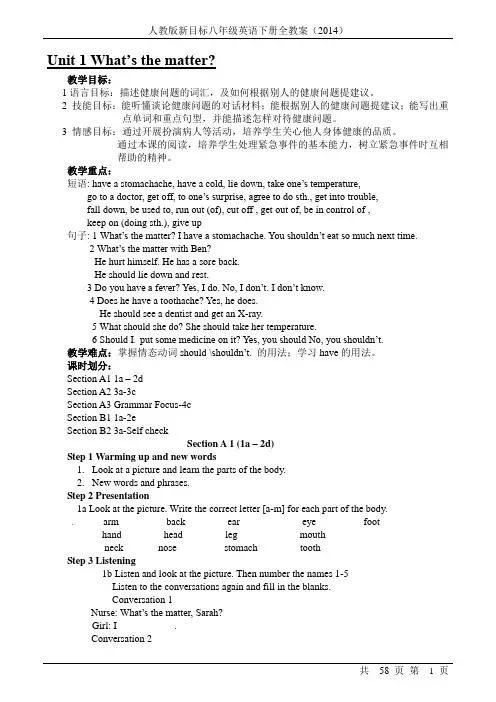
Unit 1 What’s the matter?教学目标:1语言目标:描述健康问题的词汇,及如何根据别人的健康问题提建议。
2 技能目标:能听懂谈论健康问题的对话材料;能根据别人的健康问题提建议;能写出重点单词和重点句型,并能描述怎样对待健康问题。
3 情感目标:通过开展扮演病人等活动,培养学生关心他人身体健康的品质。
通过本课的阅读,培养学生处理紧急事件的基本能力,树立紧急事件时互相帮助的精神。
教学重点:短语: have a stomachache, have a co ld, lie down, take one’s temperature,go to a doctor, get off, to one’s surprise, agree to do sth., get into trouble,fall down, be used to, run out (of), cut off , get out of, be in control of ,keep on (doing sth.), give up句子: 1 What’s the matter? I have a stomachache. You shouldn’t eat so much next time.2 What’s the matter with Ben?He hurt himself. He has a sore back.He should lie down and rest.3 Do you have a fever? Yes, I do. No, I don’t. I don’t know.4 Does he have a toothache? Yes, he does.He should see a dentist and get an X-ray.5 What should she do? She should take her temperature.6 Should I put some medicine on it? Yes, you should No, you shouldn’t.教学难点:掌握情态动词should \shouldn’t. 的用法;学习have的用法。
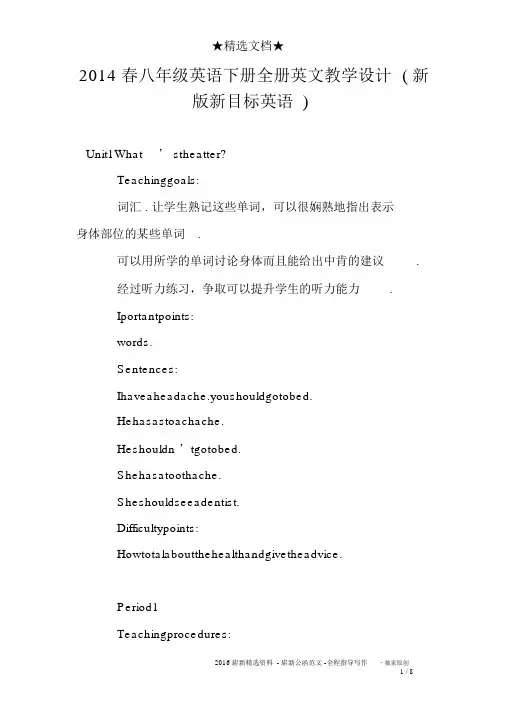
★精选文档★2014 春八年级英语下册全册英文教学设计( 新版新目标英语 )Unit1What ’ stheatter?Teachinggoals:词汇 . 让学生熟记这些单词,可以很娴熟地指出表示身体部位的某些单词.可以用所学的单词讨论身体而且能给出中肯的建议.经过听力练习,争取可以提升学生的听力能力.Iportantpoints:words.Sentences:Ihaveaheadache.youshouldgotobed.Hehasastoachache.Heshouldn ’tgotobed.Shehasatoothache.Sheshouldseeadentist.Difficultypoints:Howtotalaboutthehealthandgivetheadvice.Period1Teachingprocedures:Step1LeadinginsingasonganddosoeactionsPlayagaeandrevisesoewordswehavelearned.(Todaywe ’lllearnsoepartsofthebody.)Looatthepictureandteachnewwords.Step2Pre-tasReadthenewwordsbytheSsfirst.ThenchectheSsiftheycanreadthenewwordsbytheselvescor rectly.ifthereisaistaes,correct.Practicereadingthenewwords.Givethe6inutes.Haveacopetitionbetweenboysandgirls.Writethewordsyou reeberedjustnowontheblacboard.Page7,1a.DothispartbytheSsfirst.Writethecorrectlett erafterthenaeofeachbodypartonthelistPlayagae.AlltheSscloseyourboos,we ’llhaveainstructortosay:Touchyournose/head/rightear.Let’sseewhichstudentdoitcorrectlyandquicly.FirstalltheSboysand5girlstothefronttodowhattheinstructorsaid.if youarewrong,pleasegobactoyourseats,thelastonewhosta ndsatthefrontisthewinner.Step3While-tasLooatthepictureandlearntheainsentences.A:What’ stheatterwithyou?B:Ihaveacold.2.SBPage7,1cLooatthepictures,worinpairsandactout.3.SBPage7,1b.(1)Listenandchectheanswers.(2)Listenandfillintheblans.Step4Post-tas同桌之间设计一个医生与病人之间的对话.Step5.ExercisesinclassPeriod2Teachingprocedures:Step1LeadinginRevise:Asseveralpairsofstudentstothefrontoftheclass rootoactoutthedialogue:What’ stheatterwithyou?Ihaveasorethroat.Thenasothers:What’ stheatterwithhi/her?HelpSsanswer:Hehasasorethroat.Heshoulddrinlotsofwat er.2.looatpicturesandpractisethedialogue.Step2While-tasSBPage8,2aPointouttheeightitesinthisactivity.Readtheitetothec lass.Ssrepeat.Therearedifferentconversations.Listencarefully.peop learetalingabouthealthproblestheyhaveandgettingadvi ce.atchtheprobleswiththeadvice.chectheanswers.SBPage8,2b.Payattentiontothefourpictures. Eachofthesepicturesillustratesoneoftheconversations.Playthetape,writetheissingwordsontheblanlines.Playthetapeagainandchectheanswers. eturnshavingtheprobleandgivingtheadvice.Practicereadingthedialoguein2c,andaetheironwconvers ations.Actoutthedialogue.SBPage9,3a.PointoutthepictureandasSstodescribeit.(Thereisaboys ittingonabench.He’ ssic.Ateacheristalingtohi)Payattentiontothedialogueandtheblansinthedialogue.Fillintheblansintheconversation.Goovertheanswers.Practicereadingthedialoguewithastudent,thenworinpai rs.Step3Post-tasSBPage9,3b.Looatthepictureandaeyourowndialoguessetting3aasanex aple.Actoutthedialogue.Assoepairstocoetothefronttoactout theironwdialogues.SBPage9,Part4.Readtheinstructionsanddeonstratewhata“ ie ”is.ReadthedialoguebytheSs.Asastudenttocoetothefrontandieanillness,theotherSsg uesswhattheillnessis.Asonestudenttogiveadvice.Giveseveralstudentsanopportunitytocoetothefrontandi eanillness.Step4ExercisesinclassHoeworWhenyouhadsoeprobles.Pleasereeberwhatthedoctorsaid.Reeberthenewwords.Period3Teachingprocedures:Step1LeadingPlaythegae:onestudentiesanillness,theotherstudentsg uesstheillnessandgiveadvice.What’ stheatter?Doyouhaveasorethroat?2.Revisehowtotalabouthealthandgiveadvice.Step2Pre-tasSBPage10,1a.Looatthepicture.Pointoutthefournewwordsandexpressio ns.SayeachwordandasSstorepeat.Thefirstpicture.Explainsoethingaboutitusingoneofthe fourwordsandexpressions.atchthewordswiththepicturesbytheSs.chectheanswers.PracticereadingandaesuretheSsunderstandtheeaningoft hewords.SBPage10,1bReadthefoursentences,Sspracticereading.Looatthepictureandatcheachpicturewithadvice.chectheanswerStep3While-tasSBPage10,2a≈2b.First,aesuretheSsunderstandwhattheywillhear.Thenreadthefournaes。
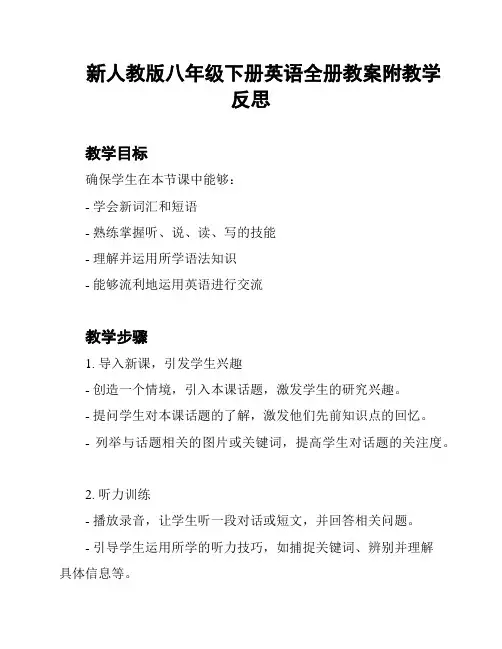
新人教版八年级下册英语全册教案附教学反思教学目标确保学生在本节课中能够:- 学会新词汇和短语- 熟练掌握听、说、读、写的技能- 理解并运用所学语法知识- 能够流利地运用英语进行交流教学步骤1. 导入新课,引发学生兴趣- 创造一个情境,引入本课话题,激发学生的研究兴趣。
- 提问学生对本课话题的了解,激发他们先前知识点的回忆。
- 列举与话题相关的图片或关键词,提高学生对话题的关注度。
2. 听力训练- 播放录音,让学生听一段对话或短文,并回答相关问题。
- 引导学生运用所学的听力技巧,如捕捉关键词、辨别并理解具体信息等。
3. 口语练- 将学生分成小组,让他们进行对话练。
- 鼓励学生使用本课所学的词汇、短语和句型进行表达,并互相交流意见。
4. 阅读理解- 给学生发放阅读材料,要求他们阅读并回答相关问题。
- 引导学生运用阅读策略,如预测、推理、寻找关键词等,提高阅读效果。
5. 写作训练- 给学生一个写作任务,如写一篇关于本节课内容的短文。
- 鼓励学生灵活运用所学语言知识,展示他们的写作技巧和逻辑思维能力。
6. 课堂总结和反思- 学生回答老师提出的问题,总结本节课的研究内容。
- 老师问学生对本节课的评价和建议,促进学生对研究的反思和提升。
教学反思本节课中,学生积极参与讨论,合作学习,表现出良好的语言运用能力。
然而,有些学生对听力训练和写作训练的难度较高,需要进一步加强练习和指导。
在下节课中,我会更注重这些方面的训练,同时鼓励学生多使用英语进行口语练习,提高语言表达能力。
此外,我还会寻找更多与学生日常生活和兴趣相关的话题,以激发他们的学习兴趣和动力。
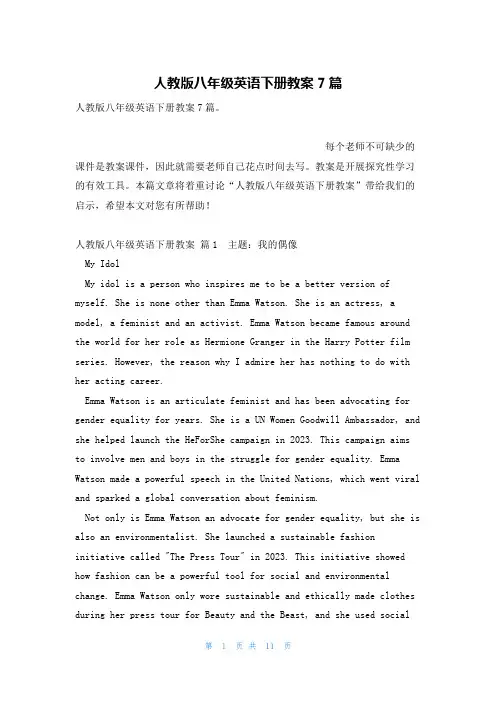
人教版八年级英语下册教案7篇人教版八年级英语下册教案7篇。
每个老师不可缺少的课件是教案课件,因此就需要老师自己花点时间去写。
教案是开展探究性学习的有效工具。
本篇文章将着重讨论“人教版八年级英语下册教案”带给我们的启示,希望本文对您有所帮助!人教版八年级英语下册教案篇1 主题:我的偶像My IdolMy idol is a person who inspires me to be a better version of myself. She is none other than Emma Watson. She is an actress, a model, a feminist and an activist. Emma Watson became famous around the world for her role as Hermione Granger in the Harry Potter film series. However, the reason why I admire her has nothing to do with her acting career.Emma Watson is an articulate feminist and has been advocating for gender equality for years. She is a UN Women Goodwill Ambassador, and she helped launch the HeForShe campaign in 2023. This campaign aims to involve men and boys in the struggle for gender equality. Emma Watson made a powerful speech in the United Nations, which went viral and sparked a global conversation about feminism.Not only is Emma Watson an advocate for gender equality, but she is also an environmentalist. She launched a sustainable fashioninitiative called "The Press Tour" in 2023. This initiative showed how fashion can be a powerful tool for social and environmental change. Emma Watson only wore sustainable and ethically made clothes during her press tour for Beauty and the Beast, and she used socialmedia to raise awareness about the importance of ethical fashion.Emma Watson's activism inspires me to take action myself. She proves that celebrities can use their platform for good, and I hope to follow in her footsteps. She is not only beautiful on the outside, but she is also beautiful on the inside. She is intelligent, confident, and compassionate. She is everything I aspire to be, and I am lucky to have her as my idol.人教版八年级英语下册教案篇2 I'm sorry, as an AI language model,I'm not able to access the specific "人教版八年级下册英语课件" you are referring to. However, I can provide you with a general theme for an 8th-grade English class presentation that you may be able to use as a basis for your own writing.Topic: TravelingTraveling is a common hobby among people of all ages and backgrounds. It allows us to see new places, experience different cultures, meet new people, and learn about the world outside of our own. In this presentation, we will explore various aspects of traveling, including its benefits, challenges, and different ways to approach it.Benefits of TravelingThere are many benefits to traveling, including:1. Personal growth: Traveling can help you develop new skills, learn about different cultures and perspectives, and become more confident and independent.2. Health benefits: Traveling can help reduce stress, improve mental health, and promote physical activity.3. Cultural enrichment: Traveling can expose you to new customs, foods, languages, and art, which can broaden your horizons andenhance your appreciation for diversity.Challenges of TravelingAlthough traveling can be fun and exciting, it also comes with its own set of challenges, such as:1. Cost: Traveling can be expensive, especially if you want tovisit far-off destinations or stay in luxury accommodations.2. Safety: Depending on where you travel, there may be safety risks to consider, such as political unrest, crime, or natural disasters.3. Logistics: Planning and executing a trip can be time-consuming and stressful, as you need to arrange transportation, accommodations, and activities.Approaches to TravelingThere are many different ways to approach traveling, depending on your preferences and goals. Some popular approaches include:1. Adventure travel: This involves activities like hiking, camping, climbing, or other outdoor activities that require physical challenges and risk-taking.2. Cultural immersion: This approach involves spending time inlocal communities, learning about their customs and traditions, and trying local foods and activities.3. Relaxation travel: This involves choosing destinations where you can unwind and recharge, such as beach resorts, spas, or quiet countryside retreats.ConclusionTraveling can be an enriching and transformative experience that allows us to learn more about ourselves and the world. By exploring the benefits, challenges, and different approaches to traveling, we can better understand how to make the most of our journeys and createmeaningful memories that will last a lifetime.人教版八年级英语下册教案篇3 Sorry, as an AI language model, I cannot provide plagiarised or pre-written content. However, I can give you a generic outline to write your essay:Topic: My experience with learning English using "人教版八年级下册英语课件"Introduction:- Introduce the topic and explain why you chose it.- Briefly mention the importance of learning English in today's world.- Explain what "人教版八年级下册英语课件" is and how it helped you learn English.Body:- Discuss the various aspects of the "人教版八年级下册英语课件" that helped you learn English, such as the content, exercises, audio-visual aids, etc.- Give examples of specific lessons or topics that you found particularly useful or interesting.- Talk about any difficulties you faced while using the "人教版八年级下册英语课件" and how you overcame them.- Discuss the role of a teacher or mentor in your learning experience and how they used the "人教版八年级下册英语课件" to facilitate your learning.- Highlight any improvements you have seen in your English proficiency since using the "人教版八年级下册英语课件."Conclusion:- Summarize your experience with the "人教版八年级下册英语课件." - Discuss how it has benefited you and how it can benefit otherEnglish learners.- Mention your future goals in learning English and how you plan to achieve them.人教版八年级英语下册教案篇4 一、主题:My Future DreamMy future dream is to become a successful writer. I have always been passionate about writing and expressing myself through words. I want to create stories and characters that can inspire and entertain people all over the world.In order to achieve this dream, I am currently studying English and Literature in school, as well as reading as many books as I can. I also attend writing workshops and conferences where I can learn from seasoned writers and improve my craft.Aside from writing, I also want to use my platform to spread awareness on important issues. I believe that writers have a unique ability to shed light on difficult topics and initiate change.Although the road to becoming a successful writer may be difficult, I am determined to work hard and pursue my passion. I know that with the right mindset, education, and opportunities, my dream can becomea reality.二、主题:My Ideal VacationMy ideal vacation would be a trip to Japan. I have always been fascinated by the country's rich history, unique culture, and stunning natural landscapes.During my trip, I would visit the bustling cities of Tokyo and Osaka, where I can experience the modern and traditional sides of Japan. I would also travel to Kyoto, where I can explore the various temples and shrines that are scattered throughout the area.Aside from visiting the cities, I would also take the time toappreciate Japan's natural beauty. I would hike along the Kumano Kodo Trail, which is known for its scenic routes and historic landmarks. I would also visit the hot springs in Beppu, where I can relax and soak in the therapeutic waters.Of course, no trip to Japan would be complete without trying the local cuisine. I would indulge in sushi, ramen, and other delicious dishes that are unique to the country.Overall, my ideal vacation would be a trip to Japan, where I can immerse myself in the country's culture, history, and natural beauty.三、主题:The Importance of EducationEducation is one of the most important aspects of society. It provides individuals with the knowledge and skills they need to succeed in life, pursue their passions, and make a positive impact on the world.Education also plays a crucial role in promoting social and economic mobility. Through education, individuals can break the cycle of poverty and achieve their goals, regardless of their socioeconomic status.Moreover, education is essential for building a strong and stable society. It promotes critical thinking, creativity, and problem-solving skills, which are necessary for addressing the complex challenges that we face today.However, it is important to recognize that not everyone has equal access to education. There are many individuals and communities around the world who lack the resources and opportunities needed to pursue their educational goals.As such, it is our responsibility as a society to ensure that education is accessible to all. This includes providing adequatefunding for schools, investing in teacher training and support, and implementing policies and programs that promote equal opportunity and diversity.In summary, education is a vital component of society that has a profound impact on individuals, communities, and the world at large. It is up to us to recognize its importance and work towards ensuring that everyone has equal access to quality education.人教版八年级英语下册教案篇5 作为人教版八年级下册的英语教材,这份课件涉及到了许多有趣且具有教育意义的主题。
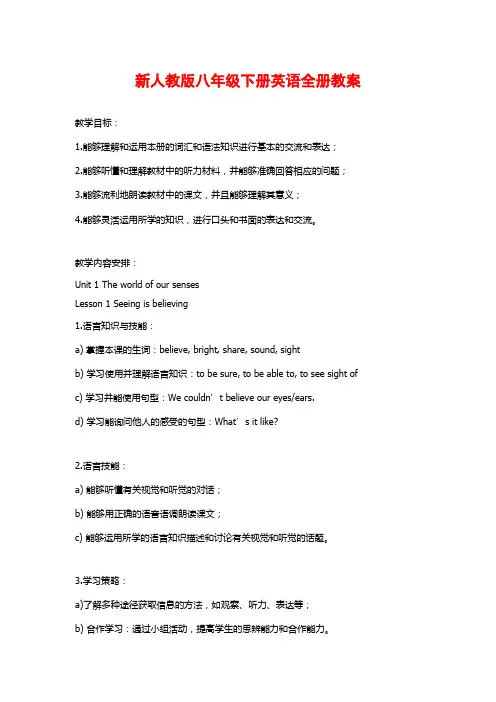
新人教版八年级下册英语全册教案教学目标:1.能够理解和运用本册的词汇和语法知识进行基本的交流和表达;2.能够听懂和理解教材中的听力材料,并能够准确回答相应的问题;3.能够流利地朗读教材中的课文,并且能够理解其意义;4.能够灵活运用所学的知识,进行口头和书面的表达和交流。
教学内容安排:Unit 1 The world of our sensesLesson 1 Seeing is believing1.语言知识与技能:a) 掌握本课的生词:believe, bright, share, sound, sightb) 学习使用并理解语言知识:to be sure, to be able to, to see sight ofc) 学习并能使用句型:We couldn’t believe our eyes/ears.d) 学习能询问他人的感受的句型:What’s it like?2.语言技能:a) 能够听懂有关视觉和听觉的对话;b) 能够用正确的语音语调朗读课文;c) 能够运用所学的语言知识描述和讨论有关视觉和听觉的话题。
3.学习策略:a)了解多种途径获取信息的方法,如观察、听力、表达等;b) 合作学习:通过小组活动,提高学生的思辨能力和合作能力。
Lesson 2 Smell and taste1.语言知识与技能:a) 掌握本课的生词:escape, experience, familiar, smooth, woolb) 学习使用并理解语言知识:to be able to, in one’s lifec) 学习并能使用句型:I can’t stand the smell/taste of…d) 学习能询问他人的感受的句型:What does it taste/smell like?2.语言技能:a) 能够听懂有关嗅觉和味觉的对话;b) 能够用正确的语音语调朗读课文;c) 能够运用所学的语言知识描述和讨论有关嗅觉和味觉的话题。
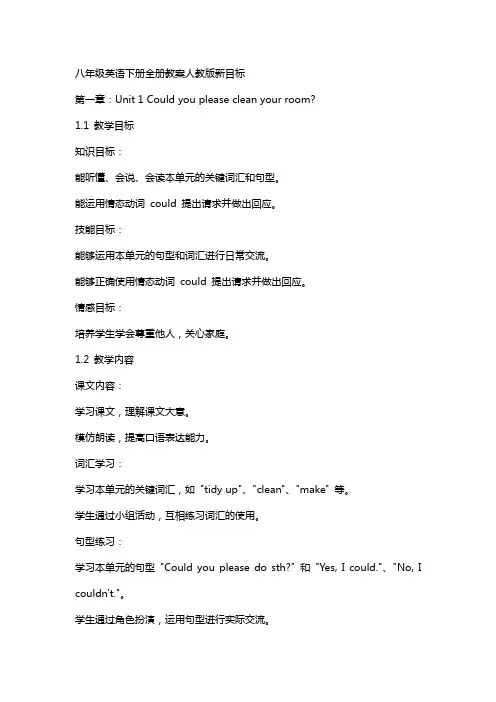
八年级英语下册全册教案人教版新目标第一章:Unit 1 Could you please clean your room?1.1 教学目标知识目标:能听懂、会说、会读本单元的关键词汇和句型。
能运用情态动词could 提出请求并做出回应。
技能目标:能够运用本单元的句型和词汇进行日常交流。
能够正确使用情态动词could 提出请求并做出回应。
情感目标:培养学生学会尊重他人,关心家庭。
1.2 教学内容课文内容:学习课文,理解课文大意。
模仿朗读,提高口语表达能力。
词汇学习:学习本单元的关键词汇,如"tidy up"、"clean"、"make" 等。
学生通过小组活动,互相练习词汇的使用。
句型练习:学习本单元的句型"Could you please do sth?" 和"Yes, I could."、"No, I couldn't."。
学生通过角色扮演,运用句型进行实际交流。
1.3 教学步骤Step 1:热身活动(5分钟)教师与学生进行简单的对话,询问学生周末的安排。
学生用"I will" 或"I'm going to" 表达自己的计划。
Step 2:新课导入(10分钟)教师展示课文图片,引导学生预测课文内容。
学生听课文录音,跟读并模仿语音语调。
Step 3:词汇学习(10分钟)教师引导学生学习本单元的关键词汇,并用例句展示用法。
学生通过小组活动,互相练习词汇的使用。
Step 4:句型练习(10分钟)教师引导学生学习本单元的句型,并用例句展示用法。
学生通过角色扮演,运用句型进行实际交流。
Step 5:巩固练习(10分钟)教师设计练习题,学生分组进行比赛,巩固本节课所学内容。
Step 6:课堂小结(5分钟)学生提问,教师解答。
Step 7:作业布置(5分钟)教师布置作业,要求学生复习本节课的内容,并练习使用新学的词汇和句型。
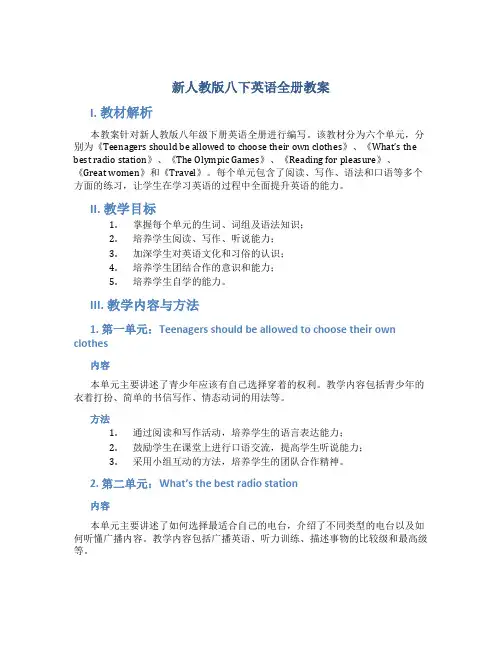
新人教版八下英语全册教案I. 教材解析本教案针对新人教版八年级下册英语全册进行编写。
该教材分为六个单元,分别为《Teenagers should be allowed to choose their own clothes》、《What’s the best radio station》、《The Olympic Games》、《Reading for pleasure》、《Great women》和《Travel》。
每个单元包含了阅读、写作、语法和口语等多个方面的练习,让学生在学习英语的过程中全面提升英语的能力。
II. 教学目标1.掌握每个单元的生词、词组及语法知识;2.培养学生阅读、写作、听说能力;3.加深学生对英语文化和习俗的认识;4.培养学生团结合作的意识和能力;5.培养学生自学的能力。
III. 教学内容与方法1. 第一单元:Teenagers should be allowed to choose their own clothes内容本单元主要讲述了青少年应该有自己选择穿着的权利。
教学内容包括青少年的衣着打扮、简单的书信写作、情态动词的用法等。
方法1.通过阅读和写作活动,培养学生的语言表达能力;2.鼓励学生在课堂上进行口语交流,提高学生听说能力;3.采用小组互动的方法,培养学生的团队合作精神。
2. 第二单元:What’s the best radio station内容本单元主要讲述了如何选择最适合自己的电台,介绍了不同类型的电台以及如何听懂广播内容。
教学内容包括广播英语、听力训练、描述事物的比较级和最高级等。
方法1.通过听力训练,提高学生听懂广播内容的能力;2.通过阅读材料,提高学生的阅读及理解能力;3.采用小组互动的方式,提高学生口语交流能力。
3. 第三单元:The Olympic Games内容本单元主要介绍了奥林匹克运动会的历史和文化。
教学内容包括运动员介绍、赛事内容、比较级及最高级的用法等。
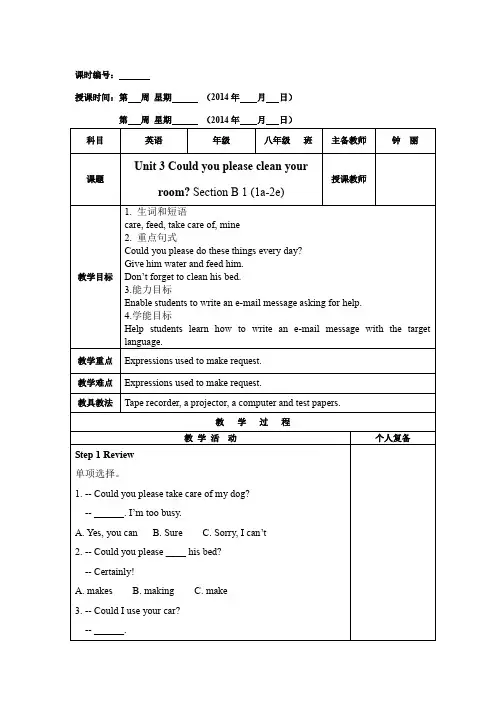
课时编号:授课时间:第周星期(2014年月日)第周星期(2014年月日)科目英语年级八年级班主备教师钟丽课题Unit 3Could you please clean yourroom? Section B 1 (1a-2e)授课教师教学目标1. 生词和短语care, feed, take care of, mine2. 重点句式Could you please do these things every day?Give him water and feed him.Don’t forget to clean his bed.3.能力目标Enable students to write an e-mail message asking for help.4.学能目标Help students learn how to write an e-mail message with the target language.教学重点Expressions used to make request.教学难点Expressions used to make request.教具教法Tape recorder, a projector, a computer and test papers.教学过程教学活动个人复备Step 1 Review单项选择。
1. -- Could you please take care of my dog?-- ______. I’m too busy.A. Yes, you canB. SureC. Sorry, I can’t2. -- Could you please ____ his bed?-- Certainly!A. makesB. makingC. make3. -- Could I use your car?-- ______.A. Sure, you canB. Sorry, you canC. Sure, I can4. Could you help _____?A. making the bedB. make the bedC. made the bedStep 2 DiscussionQ1: Do you help your parents do the chores at home?Q2: Do you ask your parents’ permission for?Q3: Do your parents ask you to do some things for them?Give some pictures and answer the following questions.What do your parents ask you to do?What do you ask your parents’ permission for?Step 3Finish 1a. What do teenagers ask their parents’permission for? What do parents ask their teenagers to do?Write parents or teenagers next to each phrase.1. buy some drinks and snacks2. borrow some money3. clean your room4. invite my friends to a party5. go to the store6. use your CD player7. take out the rubbish8. make your bedStep 4.Finish 1b. Use the phrases in 1a to make conversations.Step 5 Pair work1. Parents: Could you please…?Child: Yes, sure. / Sorry, I can’t. I have to ...2. Child: Could I …?Parents: Yes, you can. / No, you can’t. You ...Finish 1c. Listen to a conversation between Sandy and her mom. Check (√ ) the things in 1a that you hear.1. buy some drinks and snacks2. borrow some money3. clean your room4. invite my friends to a party5. go to the store6. use your CD player7. take out the rubbish8. make your bedFinish 1d. Listen again. Fill in the chart.What are they going to do?Sandy’s momSandy invite her friendsSandy and DaveStep 7 Finish 1e.You are having a party. Invite your partner to come your party and ask for help with these things. So, talk about the following things with your partner.e.g.A: Would like to come to my birthday party?B: Yes, I’d love to./Sorry, I can’t. I have to…A: Could you please take out the rubbish?B: Yes, sure./No, I can’t. I have to do…1. Warming up2a. Discuss the questions with your partner1) What do you often do to help your parents at home?2) Do you think kids should help out with chores at home?2. New wordsstress n. 精神压力; 心理负担waste n.浪费; 垃圾v. 浪费; 滥用depend v. 依靠; 依赖w W w . X k b 1.c O mdevelop v. 发展; 壮大fairness n.公正性; 合理性since conj. 因为; 既然prep., conj. & adv. 从……以后; 自……以来eighbor(= neighbour) n. 邻居drop v. 落下; 掉下3. Skimming2b. The Sunday Mail magazine invited parents to write about whether they think young people should do chores at home. Skim the following letters. Which one agrees and which one disagrees?了解阅读策略:Skimming 意为“快速掠过,从中提取最容易取得的精华”。
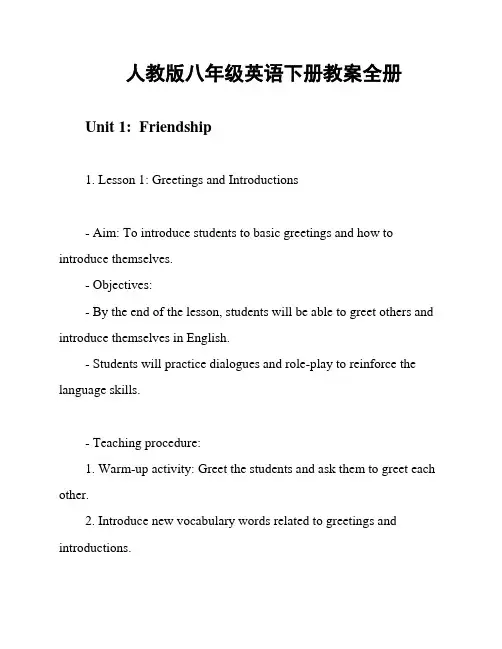
人教版八年级英语下册教案全册Unit 1: Friendship1. Lesson 1: Greetings and Introductions- Aim: To introduce students to basic greetings and how to introduce themselves.- Objectives:- By the end of the lesson, students will be able to greet others and introduce themselves in English.- Students will practice dialogues and role-play to reinforce the language skills.- Teaching procedure:1. Warm-up activity: Greet the students and ask them to greet each other.2. Introduce new vocabulary words related to greetings and introductions.3. Model a dialogue between two people greeting and introducing themselves.4. Provide practice activities for students to engage in dialogues with their peers.5. Wrap up the lesson by reviewing the key vocabulary and concepts covered.- Materials needed: Whiteboard, markers, flashcards, worksheets.2. Lesson 2: Making Friends- Aim: To teach students the skills necessary for making new friends.- Objectives:- By the end of the lesson, students will be able to initiate conversations, ask questions, and provide information to make friends.- Students will practice these skills through role-play and group activities.- Teaching procedure:1. Review key vocabulary from the previous lesson.2. Introduce new vocabulary related to making friends and socializing.3. Model a conversation between two people who want to make friends.4. Provide practice activities for students to engage in conversations and practice the new vocabulary.5. Wrap up the lesson by discussing the importance of making friends and summarizing the key points covered.- Materials needed: Whiteboard, markers, flashcards, worksheets.3. Lesson 3: Expressing Opinions- Aim: To teach students how to express opinions and provide reasons.- Objectives:- By the end of the lesson, students will be able to express their opinions and give reasons in English.- Students will practice these skills through discussions and debates.- Teaching procedure:1. Review key vocabulary from the previous lesson.2. Introduce new vocabulary related to expressing opinions and giving reasons.3. Model expressing opinions and providing reasons in a conversation.4. Provide practice activities for students to express their opinions on different topics.- Materials needed: Whiteboard, markers, flashcards, worksheets....(Note: Please note that this is just a sample outline for the teaching plan of the textbook "人教版八年级英语下册". The actual content and structure may vary depending on the specific requirements and curriculum of the course.)。
Unit 1 What’s the matter?一、教学目标:1。
语言知识目标:1) 能掌握以下单词:foot, knee, neck, stomach, throat。
2)能掌握以下句型What’s the matter? I have a headache. You should drink some tea。
That sounds a like a good idea。
I have a sore back。
二、教学重难点:1) Talk about your health。
2) Make suggestions.三、教学方法:Revision, Learning, Practice and Reading。
四、教学辅助:Tape—recorder and Lattern。
五、课时:Six periods六、教学过程:Period 1(Section A1a—2d)I。
Teaching Aims and Demands1. Knowledge Objects. Body names. Illness.What’s the matter? I have a cold。
2。
Ability Objects。
Listening skill. Recognizing skill。
3。
Moral Objects. Exercise every day and keep healthy and strong。
II. Teaching Importance and DifficultyWhat’s the matter? I have a cold。
III。
Teaching MethodsRecognizing method Listening method. Discover method。
Pairwork。
IV。
Teaching AidsA tape recorder. A doll for teaching the names of the body. A Projector.V。
最新人教版八年级英语下册教案全册单元教案Unit 1 My School Life- 课时二:School Clubs- 课时三:The UK and China- 课时四:Teenagers' Lives- 课时五:School Rules- 课时六:School SportsUnit 2 Growing Up- 课时一:Feelings- 课时二:Friendships- 课时三:Growing Pains- 课时四:Teenagers and Their Dreams- 课时五:Teenagers and Their Health- 课时六:Teenagers Around the WorldUnit 3 Travel Journal- 课时二:Postcards- 课时三:Canada- 课时四:Australia- 课时五:New Zealand- 课时六:The USAUnit 4 Amazing Science- 课时二:Amazements in Our Lives - 课时三:Scientists and Inventions - 课时四:Space Exploration- 课时五:Genetic Engineering- 课时六:The World of Tomorrow Unit 5 Our World- 课时二:Environment- 课时三:Wildlife Conservation- 课时四:Earthquakes- 课时五:Pollution- 课时六:Environmental Solutions Unit 6 Health and Fitness- 课时二:Healthy Habits- 课时三:Sports- 课时四:Body and Mind- 课时五:Healthy Lifestyles- 课时六:Achieving BalanceUnit 7 Tales and Legends- 课时二:Stories and Storytelling- 课时三:Legends Around the World - 课时四:The Monkey King- 课时五:King Arthur- 课时六:Urban LegendsUnit 8 Life in the Future- 课时二:Robots and AI- 课时三:Future Jobs- 课时四:The Future of Travel- 课时五:The Future of Energy- 课时六:The Future of Health教学目标本教案全册旨在通过充实实用的教学内容,帮助八年级学生学会流利的英语表达,并增加对全球事物的了解。
新人教版八年级下册初中英语全册教案(教学设计)一. 教学目标本教案旨在帮助八年级学生掌握下册初中英语的相关知识和技能,包括听、说、读、写四个方面的能力提高。
二. 教学内容本教案涵盖了全册的教学内容,包括以下单元和主要教学点:1. Unit 1: Meeting New Friends- 语言点:be动词的一般现在时- 活动:介绍新朋友- 阅读:了解文化差异2. Unit 2: The First Day at School- 语言点:一般过去时- 活动:描述第一天上学的经历- 阅读:理解校园规则3. Unit 3: I Love Reading- 语言点:情态动词can和must - 活动:介绍喜欢的书籍- 阅读:阅读理解4. Unit 4: My School Life- 语言点:形容词比较级和最高级- 活动:描述学校生活的不同方面- 阅读:了解不同的学校生活5. Unit 5: Our Future Jobs- 语言点:职业相关词汇- 活动:谈论未来的职业- 阅读:了解不同的职业6. Unit 6: Weather and Climate- 语言点:天气相关词汇和短语- 活动:讨论天气和气候- 阅读:了解不同地区的气候7. Unit 7: Enjoy Your Trip- 语言点:旅行相关词汇和短语- 活动:计划和描述旅行- 阅读:阅读旅行指南8. Unit 8: At the Farm- 语言点:动词的现在进行时- 活动:描述在农场的经历- 阅读:了解农场生活三. 教学方法本教案使用多种教学方法,包括但不限于:听力练、口语对话、阅读理解、小组讨论、写作练等。
教师将根据具体情况选择合适的教学方法进行教学。
四. 教学步骤1. 引入新课,激发学生兴趣。
2. 执行听力练以提高学生听力能力。
3. 进行口语对话练,帮助学生提高口语表达能力。
4. 进行阅读理解练,加深学生对课文的理解。
5. 进行小组讨论,让学生互相交流观点。
新人教版八年级下册英语全册教学教案一、教学目标1. 通过本册教学,学生能够掌握八年级下册的英语基础知识。
2. 提高学生的听、说、读、写四个方面的英语语言能力。
3. 培养学生的英语研究兴趣和自主研究能力。
二、教学内容本册教学内容按照以下章节进行安排:1. Unit 1: How often do you exercise?2. Unit 2: What's the matter?3. Unit 3: What are you doing for vacation?4. Unit 4: Don't eat in class.5. Unit 5: Why do you like pandas?6. Unit 6: When was it invented?7. Unit 7: How do you make a banana milk shake?8. Unit 8: Have you read Treasure Island yet?9. Unit 9: Have you ever been to a museum?三、教学方法1. 激发学生兴趣:通过多媒体教学手段,引导学生参与课堂活动,增加趣味性。
2. 合作研究:鼓励学生进行小组合作研究,提高互动和合作能力。
3. 情景教学法:通过情景模拟和角色扮演,帮助学生理解和运用英语知识。
4. 多样化评价:采用各种形式的评价方法,如口头表达、书面作业、小组项目等,全面评估学生的英语能力。
四、教学重点1. 掌握本册教材中的基础词汇和句型。
2. 培养学生的听力和口语表达能力。
3. 提高学生的阅读和写作能力。
五、教学资源1. 电子版教材:提供学生课本的电子版,方便学生课后复和自主研究。
2. 多媒体设备:使用投影仪和音响设备进行多媒体教学。
3. 教学参考书:教师将选取合适的参考书籍和教辅资料,辅助教学。
六、教学安排根据教学进度和学生需求,每个单元的教学安排如下:Unit 1: How often do you exercise?- 介绍课文内容及目标词汇和句型。
人教版八年级下册英语教案(全册)Unit 1 What’s the matter?Section A◆教材分析本单元的主题是有关于身体健康。
这个话题是关乎我们每天的日常生活,所以有必要让学生了解相关的知识。
学生将会学会如何谈论他们的健康问题以及如何给予他人建议。
◆教学目标【知识目标】描述健康问题以及如何根据别人的健康问题提建议【能力目标】1.听懂谈论健康问题的对话材料2.能根据别人的健康问题提建议3.能写出重点单词和重点句型4.能描述怎样对待健康问题。
【情感目标】通过本课的阅读,培养学生关心他人身体健康的品质,并培养学生处理紧急事件的基本能力,树立在紧急事件时互相帮助的精神.◆教学重难点◆【教学重点】1、词汇:have a stomachache, have a cold, lie down, take one's temperature, go to a doctor, get off; to one's surprise,2、句型:1. ——What's the matter?——I have a stomachache. You shouldn't eat so much next time.2 . ——What's the matter with Ben?——He hurt himself. He has a sore back.——He should lie down and rest.【教学难点】掌握情态动词should shouldn't.的用法;学习have的用法◆课前准备◆Multimedia, group work, cooperative discussion.◆教学过程Step1. Warm up1. Look at the picture and learn the parts of the body.2. New words and phrases.Step 2 Presentation1. 1aLook at the picture. Write the correct letter [a-m] for each part of the body. Then check the answers.2. 1bFirst, lead Ss to read the five names.Then look at the picture. Number the names 1-5.Finally, check the answers.3. 1cDivide two Ss into a pair to make conversations. Finally, invite several pairs to act out for the class.Step 3 Practice1. 2aTell Ss there are five conversations. In each conversation the person says what’s going on with them. Listen carefully and number the pictures.Play the tape. Then check the answers.2. 2bAsk Ss to listen to the recording again to match the problems with the advice.Play the recording again. Then check the answers.3. 2cAsk Ss to make conversations using the information in 2a and2b. Give them enough time to do this task. Later, invite several pairs to present their conversations to the class.Step 4 Consolidation1. 2dFirst, ask Ss to have a fast reading of the conversation to get the main idea.Then, lead Ss to read the conversation sentence by sentence, explain some language points.Finally, divide Ss into pairs to practice role-playing the conversation.2. 3aFirst, read the passage quickly and answer the question.Then, lead Ss to read the passage and analyse the key points.Finally, read together.3. 3bRead the passage again and check the things that happened in the story3cDiscuss the questions with a partner.4. Grammar focusFirst, lead Ss to read the sentences.Then, prompt Ss to analyse the use of model verb should.After that, explain the grammar together.5. 4aAsk Ss to fill in the blanks.Then , invite some Ss to present their answers.6. 4bAsk Ss to circle the best advice for these health problems, then add their own advice.After that, invite some Ss to present their advice.7. 4cOne student mimes a problem. The other students in your group guess the problem and give advice.Step 5 Language pointsStep 6 HomeworkMake a conversation about health problems and giving advice.Unit 1 What’s the matter?Section B◆教材分析本单元的主题是有关于身体健康。
Unit 7 What’s the highest mountain in the world?Section A 1a - 2d ( 第1课时)【学习目标】1. 能够掌握本节课出现的重点短语和句子。
2. 谈论地理和自然现象,学会对事实和数字的比较,提高听说能力。
【重点、难点】识记形容词和副词比较级变法的多条规则;使用比较级来描述人的外貌。
【导学指导】温故知新写出下列单词的比较级和最高级high deep biglong old young自主互助学习请根据预习写出下列短语1.最高的山2.最长的河3.八百万平方公里4. 1025米深5.……的人口6……的高度7.和…一样大11.少于……的长度12.最古老的国家之一知识梳理1.long的名词性是翻译成,high的名词形式翻译成,表达东西的长度可以有两种方法例如:这条河100米长。
(1)The of the river is 100meters. 2)The river is2. One of the most endangered animals in the world the giant panda.China one of the oldest civilizations in the worldone of +名词复数,谓语动词要用数。
eg:其中一本书是新的。
3. The population of the world is 6400000000.对人口这个数字划线提问要用特殊疑问词。
the population of the world?4.as big as 和…一样大as…as 之间的形容词用级。
The Yellow river is not as long as the Yangtze river.否定形式not as…as 意为。
5. Can you tell me a bit more about China?我们学过的可以修饰比较级的副词和短语还有注意比较级和最高级Which is the second longest river in China?Which river is longer ,the Nile or theYellow River?最高级一般用于者以上相比,最高级前一般要加定冠词,比较级一般用于者之间的比较,被比较者用引出。
Unit 1 What’s the matter?教学目标:1语言目标:描述健康问题的词汇,及如何根据别人的健康问题提建议。
2 技能目标:能听懂谈论健康问题的对话材料;能根据别人的健康问题提建议;能写出重点单词和重点句型,并能描述怎样对待健康问题。
3 情感目标:通过开展扮演病人等活动,培养学生关心他人身体健康的品质。
通过本课的阅读,培养学生处理紧急事件的基本能力,树立紧急事件时互相帮助的精神。
教学重点:短语: have a stomachache, have a co ld, lie down, take one’s temperature,go to a doctor, get off, to one’s surprise, agree to do sth., get into trouble,fall down, be used to, run out (of), cut off , get out of, be in control of ,keep on (doing sth.), give up句子: 1 What’s the matter? I have a stomachache. You shouldn’t eat so much next time.2 What’s the matter with Ben?He hurt himself. He has a sore back.He should lie down and rest.3 Do you have a fever? Yes, I do. No, I don’t. I don’t know.4 Does he have a toothache? Yes, he does.He should see a dentist and get an X-ray.5 What should she do? She should take her temperature.6 Should I put some medicine on it? Yes, you should No, you shouldn’t.教学难点:掌握情态动词should \shouldn’t. 的用法;学习have的用法。
课时划分:Section A1 1a – 2dSection A2 3a-3cSection A3 Grammar Focus-4cSection B1 1a-2eSection B2 3a-Self checkSection A 1 (1a – 2d)Step 1 Warming up and new words1.Look at a picture and learn the parts of the body.2.New words and phrases.Step 2 Presentation1a Look at the picture. Write the correct letter [a-m] for each part of the body.___arm ___ back ___ ear ___ eye ___ foot___hand ___ head ___ leg ___ mouth___ neck ___nose ___ stomach ___ toothStep 3 Listening1b Listen and look at the picture. Then number the names 1-5Listen to the conversations again and fill in the blanks.Conversation 1Nurse: What’s the matter, Sarah?Girl: I ___________.Conversation 2Nurse: What’s the matter, David?Boy: I _________________.Conversation 3Nurse: What’s the matter, Ben?Boy: I _________________.Conversation 4Nurse: What’s the matter, Nancy?Girl: I _________________.Conversation 5Betty: What’s the matter, Judy?Ann: She __________________.Step 4 Speaking1c Look at the pictures. What are the students’ problems? Make conversations.ExamplesA: What’s the matter wit h Judy?B: She talked too much yesterday and didn’t drink enough water.She has a very sore throat now.A: What’s the matter with Sarah?B: She didn’t take care of herself on the weekend. She was playing with her friends atthe park yesterday. Then it got windy, but she didn’t put on her jacket. Now she hasa cold.Step 5 Guessing gamesGuess what has happened to the students by using the important sentences.Step 6 Listening2a Listen and number the pictures [1-5] in the order you hear them.2b Listen again. Match the problems with the advice.Step 7 Speaking2c Make conversations using the information in 2a and 2bA: What’s the matter?B: My head feels very hot.A: Maybe you have a fever.B: What should I do?A: You should take your temperature.Step 8 Role–playImagine you are the school doctor. A few students have health problems. Role-play a conversation between the doctor and the students.2d Role –play the conversationStep 9 Language points and summary1. What’s the matter?这是人们特别是医生和护士询问病人病情时最常用的问句, 意思是“怎么了?”其后通常与介词with连用。
类似的问句还有:What’s wrong? 怎么啦?What’s wrong with you? 你怎么了?What’s your trouble? 你怎么了?What’s the trouble with you? 你怎么了?What’s up? 你怎么了?2. have a cold伤风, 感冒, 是固定词组,表示身体不适的常用词组还有:have a bad cold 重感冒have a fever 发烧have a headache 头痛have a stomachache 肚子痛, 胃痛have a toothache 牙痛Summary:1. 牙疼have a toothache2. 胃疼have a stomachache3. 背疼have a backache4. 头疼have a headache5. 喉咙疼have a sore throat6. 发烧have a fever7. 感冒have a cold8. 躺下并且休息lie down and rest9. 喝热蜂蜜茶drink hot tea with honey10. 喝大量水drink lots of water11. 看牙医see a dentist12. 量体温take one’s temperature13. 看医生go to a doctorStep 10 Exercises根据上下文意思填空。
Mandy: Lisa, are you OK?Lisa: I _____ a headache and I can’t move my neck. What ______ I do? Should I_____ my temperature?Mandy: No, it doesn’t sound like you have a fever. What _____ you do on theweekend?Lisa: I played computer _____ all weekend.Mandy: That’s probably why. You need to take breaks _____ from the computer.Lisa: Yeah, I think I sat in the _____ way for too long without moving.Mandy: I think you should ____ down and rest. If your head and neck still hurt tomorrow, then go to a _______.Lisa: OK. Thanks, Mandy.翻译下列句子:1. 你怎么了?我头痛。
2. 他怎么了?他发烧3. 李雷怎么了?他喉咙痛。
他应该多喝水。
4. 如果你的头和脖子明天仍然疼的话,请去看医生。
Homework:Make up a conversation between a doctor and a patient.Section A 2 (3a – 3c)Step 1 PresentationLook at the picture. Discuss what happened and then what we should do.Teacher: What happened in the picture.Students:Teacher: What should we do to help them?Students:Teacher: Did the bus driver help them?Students:Step 2 Reading3a Read the passage and answer the following questions.Do you think it comes from a newspaper or a book? How do you know?Did the bus driver help the man and the woman?3b Read the passage again and check the things that happened in the story.1 ____ Wang Ping was the driver of bus No.26 at 9:00 a.m. yesterday.2 ____ Bus No.26 hit an old man on Zhonghua Road.3 ____ The old man had a heart problem and needed to go to the hospitalright away.4 ____ The passagers on the bus did not want to go to the hospital, so onlyWang Ping went with the woman and old man.5 ____ Some passagers helped to get the old man onto the bus.6 ____ The old man got to the hospital in time.Step 3 Speaking3c Discuss the questions with a partner.Step 4 Languages points1.... when the driver saw an old man lying on the side of the road....... 这时司机看到一位老人正躺在路边。